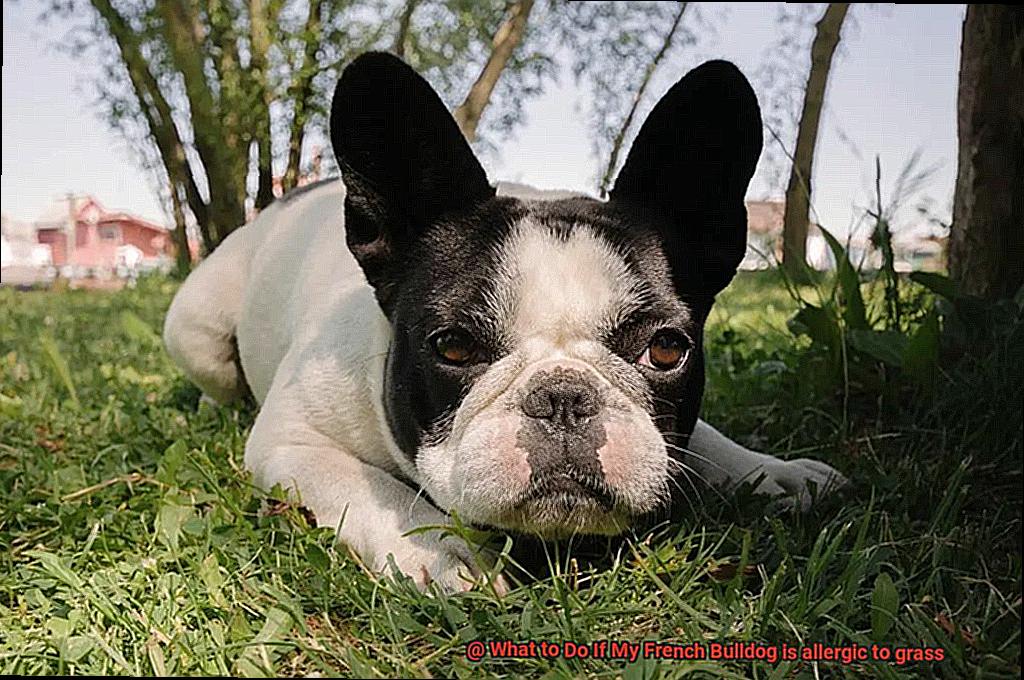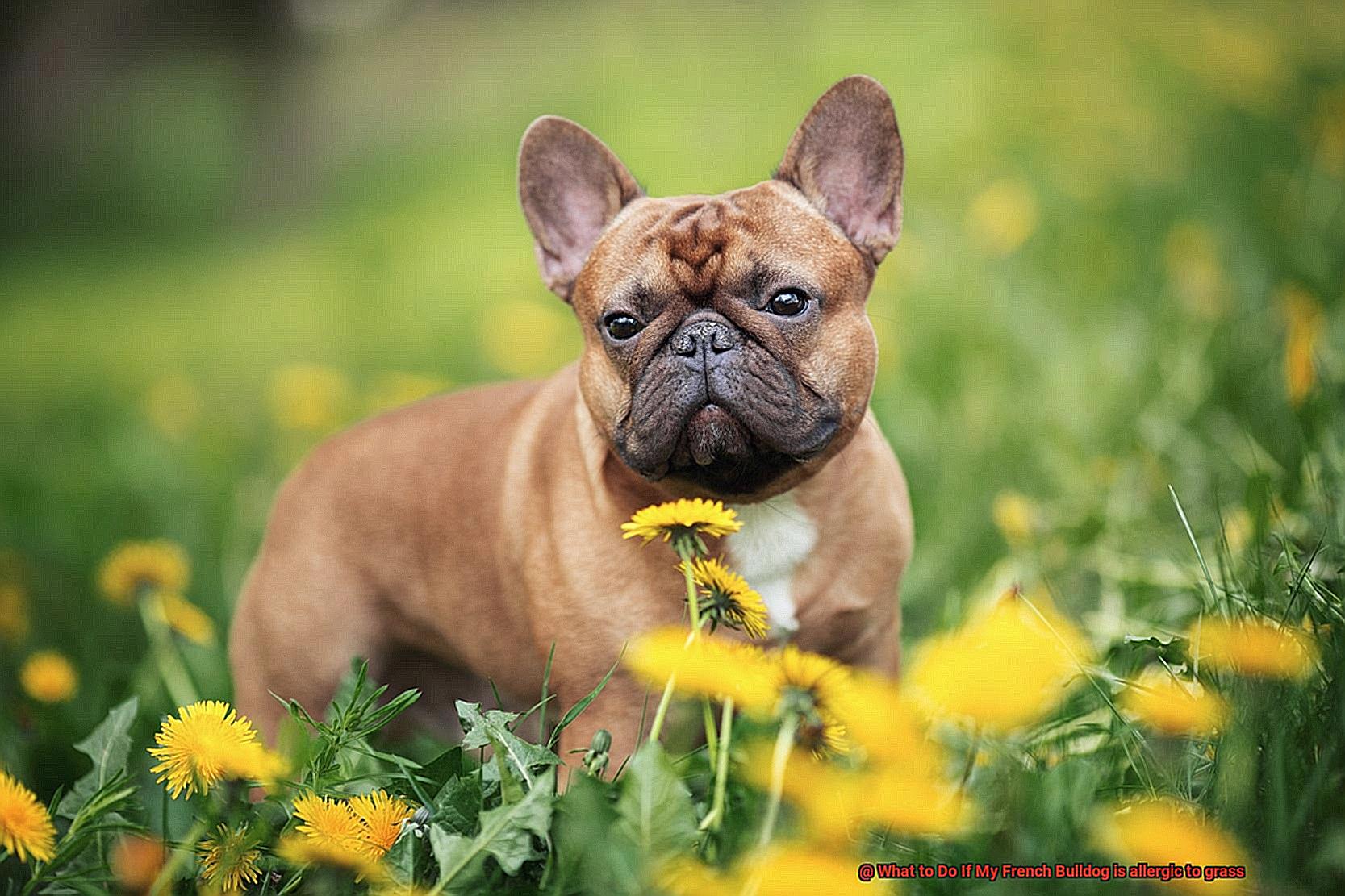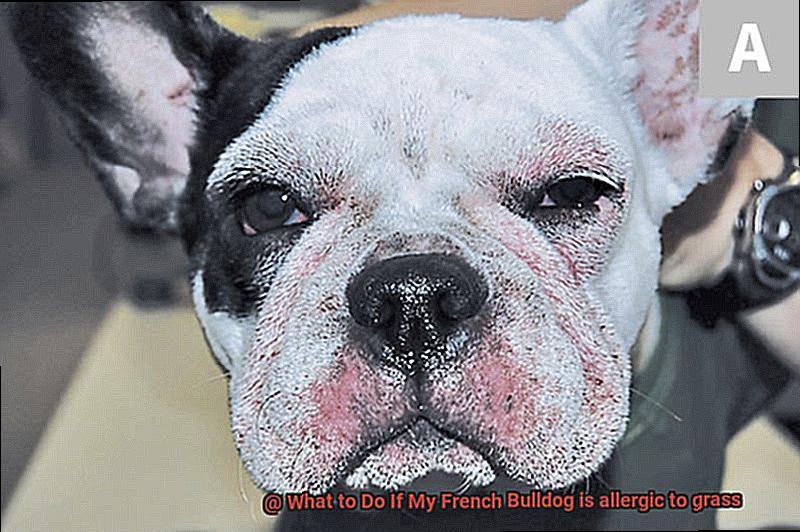What to Do If My French Bulldog is allergic to grass?
It’s heartbreaking to see your French Bulldog suffer from an allergic reaction, especially when the cause is something as common as grass. Knowing what to do if your Frenchie is allergic to grass is essential for keeping them safe and healthy.
Grass allergies in dogs are often caused by environmental factors such as pollen or mold spores in the air. These allergens can lead to skin irritation, itching, and redness. If left untreated, these conditions can become more severe and may even result in anaphylaxis.

Fortunately, there are ways you can help reduce their suffering, from the right diet and supplements to natural therapies. In this blog post, we’ll discuss what causes grass allergies in French Bulldogs and give tips on how to prevent them from occurring in the first place. We’ll also explore some of the most effective natural remedies for treating symptoms if they do occur.
By learning more about grass allergies in French Bulldogs, you can make sure your pup lives a happy life free of allergy-related pains. Keep reading to get all the information you need.
What Causes Grass Allergies in French Bulldogs?
Contents
- 1 What Causes Grass Allergies in French Bulldogs?
- 2 Signs and Symptoms of a French Bulldog Grass Allergy
- 3 Diagnosing a French Bulldog’s Grass Allergy
- 4 Treating a French Bulldog’s Grass Allergy
- 5 Preventative Measures for Managing Your Dog’s Grass Allergy
- 6 Dietary Considerations for Dogs with Grass Allergies
- 7 Alternative Exercise Options for Dogs with Grass Allergies
- 8 Conclusion
French Bulldogs, like many other breeds, can suffer from allergies to grass. This occurs when their immune system mistakenly identifies pollen or other allergens in the grass as a threat and launches an attack, leading to uncomfortable symptoms such as itching, redness, swelling, sneezing, coughing, runny nose and watery eyes.

Certain breeds are more prone to allergies due to their genetic makeup; French Bulldogs are no exception. Additionally, if your French Bulldog spends a lot of time outdoors rolling around in the grass they may be more likely to develop an allergy. To minimize exposure and manage the allergy it is important to keep them away from long grass or areas where grass has been recently cut. Investing in a high-quality air purifier for your home can also help reduce any pollen or allergens that may be present indoors.
Regular bathing and grooming will also help remove any pollen or allergens from your dog’s environment. If the allergy is severe you may need to consider changing your dog’s diet or looking into alternative forms of exercise that don’t involve outdoor activities. Working with a veterinarian can help identify and manage any underlying allergies or health issues that could be contributing to an allergic reaction.
Managing a French Bulldog’s grass allergy requires taking preventative steps as well as considering treatment options such as medications or allergy shots.
Signs and Symptoms of a French Bulldog Grass Allergy
If you have a French Bulldog, you know how important it is to keep them healthy and happy. Unfortunately, grass allergies can be difficult to manage and may cause your pup to suffer from uncomfortable symptoms. Fortunately, with the right attitude and support from your veterinarian, you can ensure your pup lives a long and happy life despite their grass allergy.
The most common signs of a grass allergy in French Bulldogs are itchiness, sneezing, coughing, runny nose/eyes, digestive upset such as vomiting or diarrhea, paw chewing/rubbing, ear infections, loss of appetite, lethargy and behavioral changes such as restlessness, anxiety or aggression. If your dog exhibits any of these symptoms after being exposed to grass or other allergens outdoors, it’s best to have them checked by your vet to rule out any underlying illnesses. Your vet may suggest performing skin testing, blood tests or elimination diet trials in order to diagnose the allergy accurately.
Once the allergy has been confirmed by your vet, there are steps you can take to reduce your pup’s exposure to allergens and minimize their symptoms. Keeping your dog away from long grass or areas where grass has been cut will help reduce their exposure. Investing in a high quality air purifier for indoors can also help remove any pollen or allergens that may be present in the home environment. Additionally regular bathing and grooming will help eliminate any pollen or allergens that may have gathered outside. Antihistamines or steroids may also help with symptoms if needed. If the grass allergy is particularly bad for your pooch then you may want to consider changing their diet or looking into alternative forms of exercise that do not involve outdoor activities.
Diagnosing a French Bulldog’s Grass Allergy
It is essential to get an accurate diagnosis from your vet. After all, the best way to help your pup feel better is to identify what is causing their discomfort.
Grass allergies can be tricky to detect since they may only show up at certain times of the year. However, there are a few ways that your vet can determine if grass is the culprit. One method is an allergy test, which involves injecting a small amount of potential allergens under your dog’s skin and monitoring for a reaction. In addition, they may suggest an elimination diet where all potential allergens are removed from your dog’s diet and then reintroduced one at a time while keeping an eye out for any reactions.
If your pup does have a grass allergy, there are steps you can take to control their symptoms and keep them comfortable. This may include avoiding areas with high amounts of grass, keeping them inside during peak grass growing season, and providing them with allergy medications as directed by your veterinarian. In more severe cases, allergy shots may be used to gradually reduce their sensitivity to grass over time.
Treating a French Bulldog’s Grass Allergy
If your French Bulldog is suffering from a grass allergy, don’t despair; there are steps you can take to help manage the condition and keep your pup happy and healthy.
The first step in treating a grass allergy in French Bulldogs is to reduce their exposure to the allergen. Keep your lawn short, remove weeds, and avoid walks in areas with high grass. You may also wish to consider protective gear such as boots or jackets when outside.
Your veterinarian may also suggest antihistamines or steroids for symptom relief. Additionally, natural remedies such as apple cider vinegar, coconut oil, and omega-3 fatty acids can help support your dog’s immune system and reduce inflammation in their body.
It’s important to note that treating a grass allergy in French Bulldogs is not something that can be achieved overnight; it may require a combination of methods and consistency for the best results.
Preventative Measures for Managing Your Dog’s Grass Allergy
Managing your pup’s grass allergy doesn’t have to be a challenge. With the right preventative steps, you can keep your beloved French Bulldog healthy and happy.
One of the most important measures is to maintain your lawn and keep it trimmed, as this will reduce the amount of pollen in the air. Regular baths with hypoallergenic shampoo also help to remove any pollen that may have accumulated on their skin or hair. Additionally, try to limit outdoor time during peak pollen seasons, which vary by location and season. To ensure complete avoidance of grass pollen, you could create an indoor play area for your pup.
If the allergy symptoms are severe, it’s worth considering allergy testing with your vet. This will help determine the best course of action for treating the allergy. Antihistamines or steroids may also help alleviate their symptoms – just make sure to follow dosage instructions as directed by your doctor.
Dietary Considerations for Dogs with Grass Allergies
When it comes to managing your French bulldog’s grass allergy, dietary considerations can be a major factor in their overall wellbeing. Although medications and other treatments may be necessary, what you feed your dog can also have a significant impact on their health.
Switching to a grain-free diet is the first step. Grains such as wheat, corn, and soy are known to cause allergic reactions in dogs, so avoiding them where possible is essential. A high-quality grain-free diet that includes protein from a single source, such as fish or duck, can provide the nutrients they need without triggering any inflammatory responses.
Supplementing with omega-3 fatty acids and vitamin E can also help reduce inflammation caused by allergies. These supplements have anti-inflammatory properties that help soothe the skin and reduce itching, making your dog feel more comfortable.
Finally, it’s important to avoid certain foods that may worsen allergy symptoms. Processed foods, artificial additives, preservatives, and fillers are all ingredients that can trigger allergic reactions and lead to further discomfort.
In conclusion, taking the right dietary steps for your French bulldog’s grass allergy is key to their overall wellbeing. Switching to a grain-free diet, supplementing with omega-3 fatty acids and vitamin E, and avoiding certain foods can help alleviate allergy symptoms and improve overall health.
xC1oTWFdKnM” >
Alternative Exercise Options for Dogs with Grass Allergies
Exercising your French Bulldog is an essential part of their health, but if they have grass allergies, it can be a challenge. Fortunately, there are plenty of alternatives available to keep your pup fit and healthy.
Swimming is a great option for dogs with grass allergies. This low-impact activity is an excellent way for them to stay active without putting strain on their joints. Plus, it’s a great way to cool down during the hot summer days. If you don’t have access to a pool or body of water, indoor playtime with interactive toys and puzzle games can provide plenty of physical stimulation without having to venture outside.
If you must go outdoors, try taking your dog for a walk on pavement, sidewalks, or trails instead of grassy areas. Just make sure to check the pavement temperature before heading out – hot pavement can burn their paw pads. Investing in a treadmill for your French Bulldog is also an excellent option; they’ll get their exercise indoors regardless of the weather outside.
Ultimately, consulting with your veterinarian is key when coming up with an exercise regimen that takes into account your pup’s grass allergies.
Also Read: What Is French Bulldog Skin Problems Yeast? – Allfrbulldogs.com
Conclusion
It’s heartbreaking to see your French Bulldog suffer from an allergic reaction, especially when the cause is something as common as grass. To ensure a happy and healthy life for your pet, it’s important to know how to handle and prevent grass allergies in French Bulldogs.
We investigated what causes grass allergies in French Bulldogs, their signs, diagnostic procedures, and treatments in this blog post. We discussed how to minimize risk by keeping your lawn short and avoiding walking in high grass areas. We also looked into natural remedies such as apple cider vinegar and omega-3 fatty acids, which may help boost your dog’s immune system and reduce inflammation.
Additionally, we addressed dietary issues for dogs with grass allergies like switching to a grain-free diet and supplementing with omega-3 fatty acids and vitamin E. Plus, we discussed alternative exercise options like swimming or indoor playtime that don’t involve going outside.




